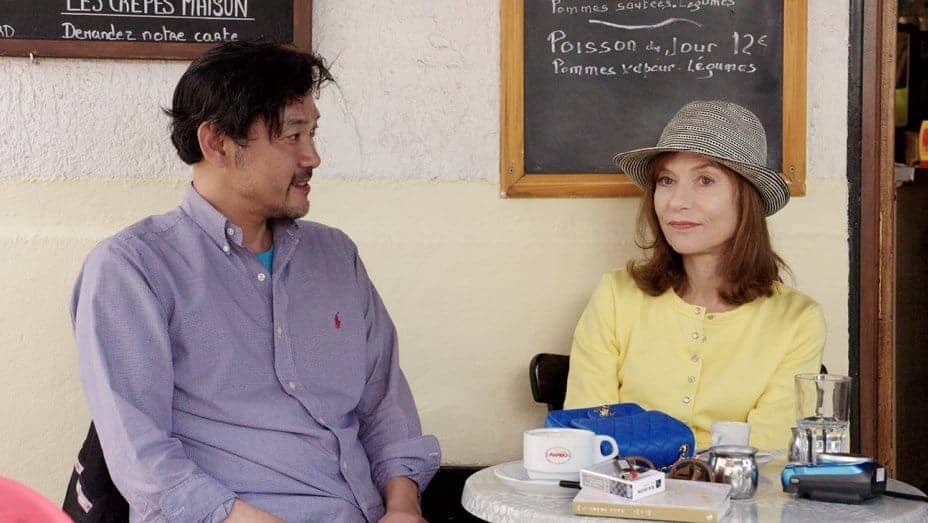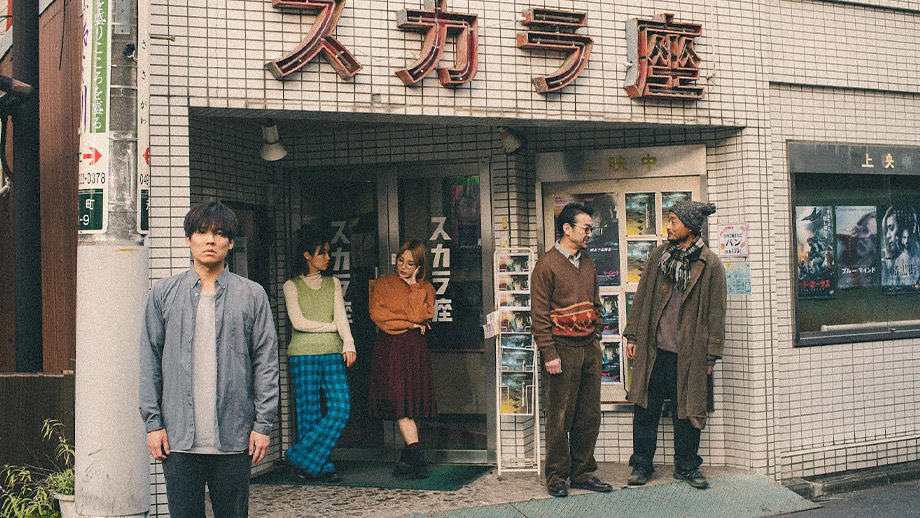By Amarsanaa Battulga
Although once “heralded by Hou Hsiao-hsien as one of Taiwan's most promising up and-coming talents to the film industry”, Chung Mong-Hong has received relatively little attention from moviegoers, critics, and scholars alike (Chang 189). The only exception is his latest film, “A Sun” (2019), which won the Golden Horse Award for Best Narrative Feature and brought him considerable international attention thanks to its release on the streaming service Netflix. Chung's first feature film, “Parking” (2008), was nominated for the Un Certain Regard Award at Cannes Film Festival but did not perform well in the box office (Xu 47). The film tells the story of its male protagonist, Chen Mo, trying to find the driver who double parked over his car and walked into other characters' lives during the process. Under closer psychoanalytical reading, what seems to be a slow-paced drama with dark humor emerges as what might be called a filmic embodiment of Freud's 1919 essay “The Uncanny.” “Parking” evokes for the audience Freudian uncanniness through its motifs of castration complex, involuntarily repetitive plot structure, the double imagery of its characters, and their return from death.
This article is part of the Asian Cinema Education Film Criticism Course 2021

Previous research on the film has largely embraced realistic or socioeconomic interpretation and focused on the depiction of the marginalized downtrodden in the marginalized urban space in Taipei (Ye 38; Chen 42; Zhao 32; Hu 182). In one of the few articles that discuss solely “Parking”, Huang Shixian employs auteur theory, film semiotics, and anthropogeography to analyze the film's unusual composition, grotesque imagery, dark humor, and aesthetics of violence (112). Chung's triple role as screenwriter, director, and cinematographer in most of his films becomes a further support to examine his works using the auteur theory. Tan Jie also follows this approach and asserts that Chung's is “the purest Taiwanese cinema since the turn of the century and not pan-Chinese cinema” (196). In perhaps the only article written in English on Chung Mong-Hong's children trilogy – “Doctor” (2006), “Parking” (2008), and “The Fourth Portrait” (2010)—Chang Ivy I-chu uses Homi Bhabha's concept of the “unhomely” to analyze the “blurring and disorder of private/public sectors” or spaces in “Parking” (Chang 205).
In approaching the movie from the perspectives of auteur theory or urban space theories, previous research has mostly focused on the film's representation of social reality and has not engaged with the latent psychoanalytical content. An exception to this social-reality-centered approach, specifically a psychoanalytical approach, can be glimpsed in Liu Cheng's passing remark that the barber's missing arm and Chen Mo's inability to have a child are “metaphors for castration” (26). This Freudian reading is also briefly mentioned in a master's thesis on Chung Mong-Hong: “The protagonist Chen Mo's wife Xiao Mei's dream is [the result of] the anxiety of not being able to have a child as well as a fulfillment of [this] wish” (Xu 11). The present psychoanalytical reading of “Parking”, in light of Freud's 1919 essay “The Uncanny,” draws inspiration from these brief mentions to Freudian concepts and from Chang's use of the “unhomely” (a concept that Homi Bhabha developed from Freud's “uncanny” in the first place).
In “The Uncanny” Freud first distinguishes the specific “uncanny” from the generic “fearful” by consulting the etymology of the original German root word heimlich (and “uncanny” as unheimlich). This investigation reveals that, among the several senses of the word heimlich, two of them mean “known, familiar” and “secret, unknown.” In Freud's words, “What is heimlich thus comes to be unheimlich” (166). In other words, heimlich is at the same time its own antonym. In light of this finding, Freud argues that the uncanny is “that class of the terrifying which leads back to something long known to us, once very familiar” (159). According to Freud, therefore, we experience uncanniness not simply in encountering the unknown, but in encountering the long-forgotten or repressed known in the unknown.

Freud asserts that E.T.A. Hoffmann successfully employs the uncanny in his fictional narratives and uses his short story “The Sandman” to elaborate the concept. In the story, the protagonist Nathanael is warned as a child about the sandman who tears out children's eyes. The eerie Coppelius comes to conduct experiments with Nathanael's father; Nathanael sees Coppelius and associates him with the sandman. Nathanael is discovered as he secretly observes Coppelius and his father conducting alchemical experiments; Coppelius wants to burn his eyes out, but the father saves him. Nathanael 's father is later killed by an explosion during one of Coppelius's visits. Later as a student, Nathanael meets the optician Coppola, from whom he buys a spy-glass. He falls in love with the automaton Olympia, whom he sees through this glass. Olympia has been produced by Spalanzani (the double of the father) and Coppola (the double of Coppelius). Nathanael observes how the two fight over the automaton and the eyes are pulled out of the robot's head. This fight between the two “fathers” repeats the fight that Coppelius and Nathanael 's father had over Nathanael himself, when he was discovered spying on their experiments. Nathanael falls into a state of insanity, but later recovers, and he is about to marry his fiancée Clara. They ascend the tower of the town hall and Nathanael sees Coppelius through his spy-glass. He goes insane again and tries to kill Clara. Her brother rescues her, but Nathanael jumps off the tower to his death. Having summarized the short story, now we can move on to the analysis of specific instances of the uncanny in “Parking”.
Freud associates Nathanael's fear of losing his eyes to the sandman with what he calls the castration complex inherent in men (173). In Parking, Chen Mo's castration complex manifests itself in his anxiety about not being able to have a child with his wife (Liu 26). This is symbolically foreshadowed in the very beginning of the film in an extreme close-up that shows Chen Mo smoking a broken cigarette—a classic phallic symbol—in his car (see fig. 1)
child
Freud also writes that “[d]ismembered limbs, a severed head, a hand cut off at the wrist, feet which dance by themselves—all these have something peculiarly uncanny about them (182). In the opening shot of the film, a headless silhouette figure (which actually is the photographer Zhang Zhaotang's work) with the two characters for the film title in place of its head appears as Chen Mo walks away from it (Huang 116; see fig. 2). The barber, a father figure who attempts to help Chen Mo but is incompetent to do so (sending him to the wrong address, stalling him so that he ends up having his car double parked again, offering him fish soup that is “inedible,” etc.), is missing a hand. In fact, the fish head that gazes (back) at Chen Mo and at the audience could arguably be another motif of the castration complex in the movie (see fig. 3). Consequently, becoming Nini's surrogate father becomes Chen Mo's way of coping with or freeing himself from this complex.
Another instance that could invoke the uncanniness, Freud writes, could be an “involuntary repetition,” that is, a recurrence of the same situations, things, and events (176). He argues that this repetition “forces upon us the idea of something fateful and inescapable, where, otherwise, we should have spoken of ‘chance' only” and that it “recalls that sense of helplessness sometimes experienced in dreams” (177). The plot of “Parking” is in fact structured as an instance of involuntary repetition. Chen Mo's car is double parked—the initiation of the plot—three times in the film: first by the pimp A Bao, then by the mafia boss, and finally by the couple who comes to a nearby clinic, most likely for an abortion.
Freud also points out the uncanniness that arises from the idea of a double (although he develops this point from another fictional work by Hoffmann, “The Devil's Elixirs”, he does not elaborate on the plot). He writes, “Hoffman accentuates this relation [of looking alike] by transferring mental processes from the one person to the other—what we should call telepathy—so that the one possesses knowledge, feeling and experience in common with the other, identifies himself with another person, so that his self becomes confounded, or the foreign self is substituted for his own—in other words, by doubling, dividing and interchanging the self. And finally there is the constant recurrence of similar situations, a same face, or character-trait, or twist of fortune, or a same crime, or even a same name recurring throughout several consecutive generations”. (174-175; emphasis added) Freud also quotes Otto Rank's argument that the double is often reflected in mirrors and with shadows (175). In analyzing “The Sandman”, Freud argues that Nathanael's father and Coppelius “represent the two opposites into which the father-imago is split” and that Professor Spalanzani and Coppola the optician “reproduce this double representation of the father-imago” (191). A similar doubling of the father (and perhaps also that of the mother) also finds expression in “Parking”. The scene in which Chen Mo first enters the apartment of the elder couple reflects certain horror aesthetics: a doll that gazes in the direction of the door that opens by itself; handheld, titled shots; and the overall dark green color tone of the apartment. In this sequence, we see arguably the first clue or hint (if we do not count the silhouette figure/Chen Mo's shadow in the opening shot) towards the doubling of Chen Mo in his reflection in the mirror (see fig. 4).
As soon as he enters their home, the grandparents identify Chen Mo with Xiao Ma, Nini's father and their deceased son. In a flashback narrated by the barber, Chen Mo finds out who Xiao Ma was and how he was executed for kidnapping his client's child for ransom and accidentally suffocating him/her in a car trunk. Interestingly, both Chen Mo and Xiao Ma are played by the same actor (see fig. 5). Moreover, this double imagery of the father is further strengthened when Chen Mo decides to lock A Bao the pimp inside his car trunk after beating him up—thus presumably repeating the “same crime” as Xiao Ma..
A similar doubling also seems to implicitly take place for Chen Mo's wife, Xiao Mei. In Chen Mo's office, she tells him that she dreamt that she had a baby in the hospital but no one was there. A dream sequence accompanies this narration and shows Xiao Mei in different settings in an empty hospital. At the end of the film, Chen Mo's voiceover reads a letter that Xiao Ma has left for Nini and we find out that Xiao Ma's wife died in the hospital soon after giving birth: “Ever since Mommy gave birth to you, she's never left the hospital again.” Thus, through the dream sequence, Xiao Mei “possesses [the] knowledge, feeling and experience” of Xiao Ma's wife.
“Many people experience the feeling [of uncanniness] in the highest degree,” Freud asserts, “in relation to death and dead bodies, to the return of the dead, and to spirits and ghosts” (180). This “return of the dead” indeed comes true at the end of the film when the grandmother sends Nini away with Chen Mo. In other words, having been identified with Xiao Ma and his wife through a flashback and a dream sequence, Chen Mo and Xiao Mei finally become the surrogate parents of Nini. This effectually resolves, therefore, both Chen Mo's castration complex and Xiao Mei's “anxiety of not being able to have a child” reflected in her dream (Xu 11).
In a 2010 interview Chung Mong-Hong says, “I wanted to present [Parking] in a storytelling way. I wanted the audience to see it in a holistic sense rather than just engage in something very direct. Because the most fascinating part of cinema for me is that there is always this ambiguity, always this distance. (Huang and Lin)
I have attempted to engage “Parking” text in one such indirect way by making use of Freud's psychoanalytic theory of the uncanny. Within this interpretation, the film emerges as what might be called a filmic embodiment of Freud's 1919 essay “The Uncanny,” evoking for the audience the uncanny experience through the protagonist's castration complex, the involuntary repetition of the plot structure, the doubling of its characters, and their return from death.
Works Cited
Chang, Ivy I-chu. “Repressed Memories and the Unhomely in Chung Mong-Hong's Children Trilogy Over.” Taiwan Cinema, Memory, and Modernity, Palgrave Macmillan, 2019, pp. 189–230, doi:https://doi.org/10.1007/978-981-13-3567-9.
Chen, Chao [陈超].透过《停车》探究台北的边缘空间与都市困境[J].电影评介, 2017 (14):41-43.
Freud, Sigmund. The Uncanny. Translated by David McLintock. Penguin Books, 2003. Hu, Xuemeng [胡雪梦].论钟孟宏作品中的荒原意识[J].文教资料,2012(27):182-184. Huang, Shixian [黄诗娴].台北的都会地理与都市流动——电影《停车》研究[J].文化艺 术研究,2017,10(04):112-119.
Huang, Yimei and Lin Wenqi [黄怡玫,林文淇].在城市的黑夜拨云见日——专访《停车》 导演钟孟宏[M]//林文淇,王玉燕,主编.台湾电影的声音:放映周报 vs 台湾影人. 台 北:书林,2010:118-127.
Liu, Cheng [刘骋].性别认同与想象中的台湾新新电影[J].电影文学,2010(24):25-27. Niu, Kewei [牛科伟].追求艺术性、思想性和欣赏性的统一——中国台湾地区导演钟孟 宏作品的美学风格[J].文教资料,2020(23):67-69.
Parking. Directed by Chung Mong-Hong. Cream Film, 2008.
Tan, Jie [谈洁].衰败的城市,无常的生命——台湾导演钟孟宏作者论[C].周斌,厉震林.新 世纪以来台湾电影的新变化.北京:中国电影出版社,2018.190-196.
Xu, Shengnan [徐胜男].钟孟宏电影研究[D].南京师范大学,2019.
Ye, Tingting [叶婷婷].钟孟宏电影风格浅析[J].声屏世界,2021(01):38-39.
Zhao, Pengyu [赵鹏宇].钟孟宏电影中的家庭伦理叙事[J].剧影月报,2020(05):31-32.















